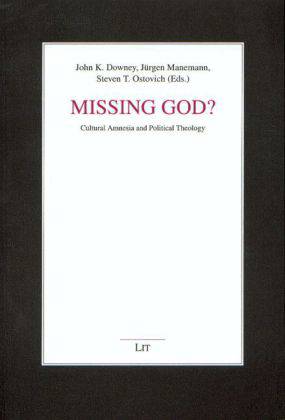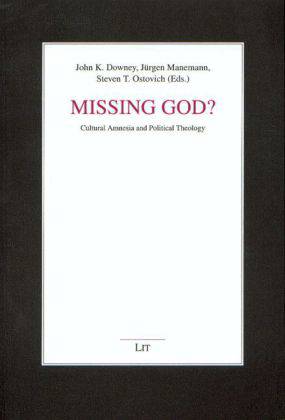
- Retrait gratuit dans votre magasin Club
- 7.000.000 titres dans notre catalogue
- Payer en toute sécurité
- Toujours un magasin près de chez vous
- Retrait gratuit dans votre magasin Club
- 7.000.0000 titres dans notre catalogue
- Payer en toute sécurité
- Toujours un magasin près de chez vous
Missing God?
Cultural Amnesia and Political Theology
19,95 €
+ 39 points
Description
Domination, objectification, and control seem to be emerging as the virtures of our time. Yet they also seem to misfire in frustration, violence, and resignation. The human voice has shrunk to a whisper, drowned out in the cacophony of consumerism, competition, egoism, and fear. Are we missing God?
Both the question and its answers are ambiguous. God may be missed in different ways. Missing God may be a matter of our missing the signs of God's presence in the world. Talk about God and theology have been marginalized as relics of the past. "Missing God" may refer to our often hidden and sometimes misdirected longing for God. The new political theology, derived from the work of Johann Baptist Metz, offers a response to our missing God. It does this as an anamnestic and eschatological resistance to forgetting grounded in a memoria passionis responding to others' suffering. Metz's model of critical understanding sublates the modern variations on the dichotomy of reason and faith and provides an antidote to our cultural amnesia in the mystical-political double-structure of faith.
A political theology takes its shape only when it engages the issues of the times. The essays in this volume are by political theologians and others influenced by Johann Baptist Metz. They sharpen the questions and imperatives which mark political theology today. In addition, this collection testifies to the dynamic continuity of political theology in its German roots and North American developments.
Included articles by Johann Baptist Metz, Matthew Ashley, M. Shawn Copeland, John K. Downey, Matthew L. Lamb, Jürgen Manemann, Bruce T. Morrill, Steven T. Ostovich, Tiemo Rainer Peters, Johann Vento, Johann Reikerstorfer, Bernd Wacker.
Both the question and its answers are ambiguous. God may be missed in different ways. Missing God may be a matter of our missing the signs of God's presence in the world. Talk about God and theology have been marginalized as relics of the past. "Missing God" may refer to our often hidden and sometimes misdirected longing for God. The new political theology, derived from the work of Johann Baptist Metz, offers a response to our missing God. It does this as an anamnestic and eschatological resistance to forgetting grounded in a memoria passionis responding to others' suffering. Metz's model of critical understanding sublates the modern variations on the dichotomy of reason and faith and provides an antidote to our cultural amnesia in the mystical-political double-structure of faith.
A political theology takes its shape only when it engages the issues of the times. The essays in this volume are by political theologians and others influenced by Johann Baptist Metz. They sharpen the questions and imperatives which mark political theology today. In addition, this collection testifies to the dynamic continuity of political theology in its German roots and North American developments.
Included articles by Johann Baptist Metz, Matthew Ashley, M. Shawn Copeland, John K. Downey, Matthew L. Lamb, Jürgen Manemann, Bruce T. Morrill, Steven T. Ostovich, Tiemo Rainer Peters, Johann Vento, Johann Reikerstorfer, Bernd Wacker.
Spécifications
Parties prenantes
- Editeur:
Contenu
- Nombre de pages :
- 192
- Langue:
- Anglais
- Collection :
- Tome:
- n° 30
Caractéristiques
- EAN:
- 9783825876517
- Format:
- Livre broché
- Dimensions :
- 162 mm x 235 mm

Les avis
Nous publions uniquement les avis qui respectent les conditions requises. Consultez nos conditions pour les avis.





